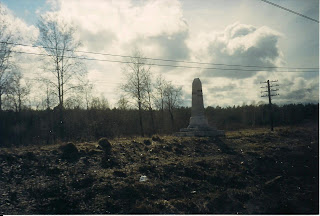World Adventurer (October 17, 2003 Chautauqua)
The train was in western Siberia, only two hours ahead of
Before that, we would stop in Yekaterinburg (1,818 km from
Ekeratinburg (Sverdlovsk) terminal
The city was founded as a factory-fort in 1723 by Peter the Great, who was determined to take advantage of the area's mineral resources, and the name of the town reflects that -
The town became a big industrial centre, supplying the local mines with machinery.
In July 1918, Tsar Nicholas II and his family were murdered there by the Bolsheviks after being held prisoner for a short time. Shot to death in the basement of a house, their bodies were thrown into a mine. Their killers attempted to destroy the evidence with grenades and acid, but the bones were found in 1991, and interred in
In 1924, the city was renamed
In 1960, U2 spy plane pilot Francis Gary Powers was shot down near there, wrecking the Paris Peace conference. He was tried and held as a spy before being exchanged back to
In 1979, a chemical leak from biological weapons plant Sverdlovsk-17 caused 64 deaths.
The city took back its original name in 1991, though many people (as well as some rail timetables) still refer to it as
Its latest claim to fame is that it is the "home town" of former President Boris Yeltsin. He was born in a small town 190 km to the east, and studied civil engineering at Yekaterinburg's technical university. He was the foreman, and then the head of the house-building organization before joining the Communist Party, becoming regional head in 1976. He was popular, and was promoted to head the Moscow Party in 1985.
In 1991, the old guard of the Party attempted to oust Gorbachev, and it was partly due to Yeltsin's rallying of the people to resist that helped it fail. Elected President, he had a colourful (to say the least) tenure before stepping down in 2000.
Terminal exterior
The train arrived in Yekaterinburg about
Terminal interior
I bought a bottle of vodka from a vendor on the platform, who showed me how to hide it under my coat. I guess the providnitsa's look out for this, and confiscate from any offenders.
We were all standing around the platform, getting the last kinks out of our legs before we took off, when the train started moving! A mad rush, and everyone was aboard safely. Whew!
We travelled through the Urals from the 1,900 until the 1,600km marker, but they sure were nothing to write home about. They just looked like a lot of rolling hills to me. Pretty countryside, though.
Passing through the Urals
The 1,777 km marker is a large white obelisk, and this marks the dividing line between Asia and
The divider between Asia and Europe
That evening, we passed through Perm (1,433 km from Moscow), which is best known as the model for the town of Yuriatin in the book "Dr. Zhivago," and for a series of UFO sightings in the 1980's. This is another defence industry city formerly closed to foreigners. One of the local attractions is an old Stalin-era prison, Perm-36.
At the 1,356 km marker, we passed into another time zone - only one hour ahead of
The next day, there wasn't too much to do besides last minute packing. My Japanese travelling companion, Masako, had reservations at a hotel close to the train station, so I decided to string along and see if there was room for me, as well.
At
The famous dissident, and Nobel laureate, Andrey Sakharov was exiled there until 1986.
It was there that we crossed the
At
There is a wonderful old steam engine at the station, and a beautiful church - St. Dmitry's
The countryside had changed dramatically since
I was thinking about two would-be world conquerors, Napoleon and Hitler. The former had taken this city, but he did not hold it long. The latter was stopped just short of winning the battle for
There was a lot of city to go through before we arrived at Yaroslavsky Station (0 km from







I would like to do that trip some day.
ReplyDelete